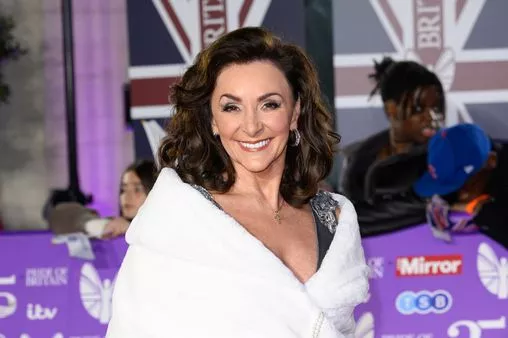Health
Shirley Ballas Opens Up About Struggle with Mental Health

Television personality Shirley Ballas has bravely revealed her battle with suicidal thoughts while struggling with depression in a candid discussion about her mental health. The 64-year-old judge from Strictly Come Dancing disclosed that her mental state deteriorated during her 50s, particularly while experiencing menopause. She compared her feelings to “plummeting into a black hole you can’t climb up from,” reflecting on how this period led her to consider ending her life.
In her new autobiography, Best Foot Forward, Ballas recounts the emotional turmoil she faced, stating, “I was anxious, depressed and desolate. I thought I was losing the plot.” She revealed that the loss of her brother, David Ballas, who died by suicide in 2003 at the age of 44, lingered heavily in her mind during her darkest moments. While she could not envision going through with suicide due to concern for her mother, she admitted, “there were certainly times when I thought I’d be better off dead.”
Ballas turned to alcohol as a coping mechanism, describing it as a crutch that exacerbated her anxiety rather than alleviating it. She explained, “I’d developed a dependency on that evening bottle of red,” while struggling to conceal her distress from family and friends. Initially, her loved ones were unaware of the extent of her struggle, but it was her son who eventually encouraged her to seek help, prompting her to consult a doctor in California.
During her consultation, she broke down while explaining her symptoms, which included uncontrollable mood swings and a reliance on alcohol. The doctor informed her that her struggles were linked to hormonal changes, a revelation that marked a turning point in her journey. He recommended bioidentical hormone replacement therapy, which involves implanting a small pellet containing oestrogen and testosterone to gradually release hormones over several months.
Ballas noted a significant positive change over time, stating, “I began to feel like my old self again.” As she navigated her recovery, she also reflected on her brother’s challenges, recognising that she had experienced similar feelings throughout her life. She stated, “The difference between me and David was that I’d been able to cope a bit better with various situations.”
Despite ongoing challenges with anxiety, Ballas has adopted therapeutic strategies, including meditation, to maintain a sense of hope. She acknowledges that days can still be difficult, revealing, “Whenever I have days where behind the eyes there’s emptiness… I just get through the day and hope that I wake up feeling brighter in the morning.”
Her decision to share her story aims to encourage others, particularly women, to seek help for their mental health. Ballas urges, “I can’t stress enough how important it is to get your hormones checked and I wish I’d asked for help sooner.”
For those experiencing mental health difficulties, resources such as Samaritans are available 24/7 at 116 123, offering support for anyone in need.
-

 Top Stories2 months ago
Top Stories2 months agoTributes Surge for 9-Year-Old Leon Briody After Cancer Battle
-

 Entertainment3 months ago
Entertainment3 months agoAimee Osbourne Joins Family for Emotional Tribute to Ozzy
-

 Politics3 months ago
Politics3 months agoDanny Healy-Rae Considers Complaint After Altercation with Garda
-

 Top Stories3 months ago
Top Stories3 months agoIreland Enjoys Summer Heat as Hurricane Erin Approaches Atlantic
-

 World4 months ago
World4 months agoHawaii Commemorates 80 Years Since Hiroshima Bombing with Ceremony
-

 Top Stories2 months ago
Top Stories2 months agoNewcastle West Woman Patricia Foley Found Safe After Urgent Search
-

 Top Stories4 months ago
Top Stories4 months agoFianna Fáil TDs Urgently Consider Maire Geoghegan-Quinn for Presidency
-

 World4 months ago
World4 months agoGaza Aid Distribution Tragedy: 20 Killed Amid Ongoing Violence
-

 World4 months ago
World4 months agoCouple Convicted of Murdering Two-Year-Old Grandson in Wales
-

 World4 months ago
World4 months agoAristocrat Constance Marten and Partner Convicted of Infant Murder
-

 Top Stories3 months ago
Top Stories3 months agoClimbing Errigal: A Must-Do Summer Adventure in Donegal
-

 Top Stories3 months ago
Top Stories3 months agoHike Donegal’s Errigal Mountain NOW for Unforgettable Summer Views









